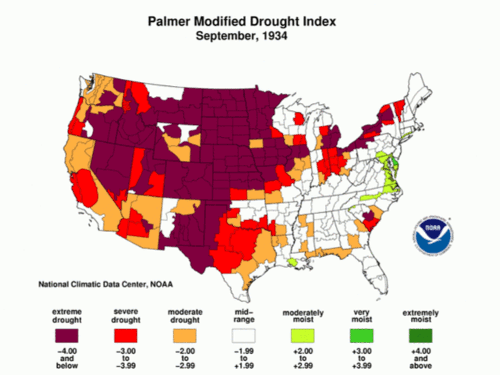How did the most extreme drought by far over the past Millennium and global heat, drought, and extreme weather happen when the man-made CO2 'control knob' was out of commission? Could it possibly be that natural forces/forcing dominates the climate and man-made CO2 is not the 'control knob' on decadal or even centennial timeframes?
US Severe Drought Down 90% Since 1934
Eighty years ago, severe drought covered most of the US, but now covers less than 5% of the country.
The Worst North American Drought Year of the Last Millennium: 1934
Benjamin I Cook, Richard Seager, and Jason E Smerdon
During the summer of 1934, over 70% of Western North America experienced extreme drought, placing this summer far outside the normal range of drought variability and making 1934 the single worst drought year of the last millennium. Strong atmospheric ridging along the West Coast suppressed cold season precipitation across the Northwest, Southwest, and California, a circulation pattern similar to the winters of 1976–1977 and 2013–2014. In the spring and summer, the drying spread tothe Midwest and Central Plains, driven by severe precipitation deficits downwind from regions of major dust storm activity, consistent with previous work linking drying during the Dust Bowl to anthropogenic dust aerosol forcing. Despite a moderate La Niña, contributions from sea surface temperature forcing were small, suggesting that the anomalous 1934 drought was primarily a consequence of atmospheric [natural] variability, possibly amplified by dust forcing that intensified and spread the drought across nearly all of Western North America.

No comments:
Post a Comment